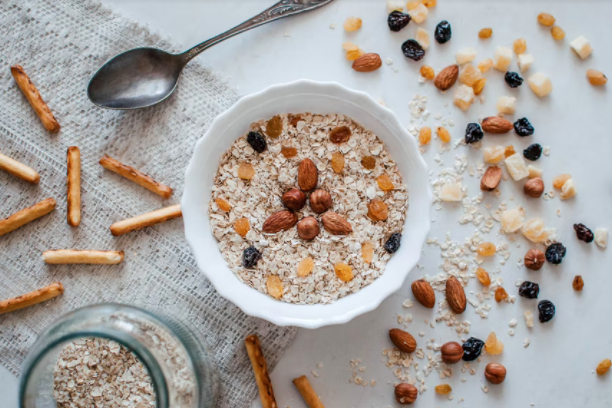Most of us grew up eating it.
Some of us ate it with milk and brown sugar.
You may have put honey, fruit, nuts, or even cream in it.
Oatmeal.
We all know that by itself, it can tend to be a bit on the ‘bland’ side.
But we also know that once you add some tasty extras, it’s delicious.
It also fills you up and gives you plenty of energy.
But here’s the real question…
Knowing what we know about nutrition, fitness, and overall health and wellness in our current modern world, does oatmeal still hold up as a strong health-friendly option?
That’s a great question.
And today, you’re going to get it answered.
Let’s dive into everyone’s favorite ‘normal’ breakfast food, and figure it out.
The Basics: Oatmeal Is (And Always Has Been) Really Good For You
Here’s the basic thing to understand about oatmeal.
In fact, Healthline.com probably said it best in their article titled 9 Health Benefits of Eating Oats and Oatmeal:
“Oats are among the healthiest grains on earth. They’re a gluten-free whole grain and a great source of important vitamins, minerals, fiber and antioxidants. Studies show that oats and oatmeal have many health benefits. These include weight loss, lower blood sugar levels and a reduced risk of heart disease.”
Healthline also goes on to list 9 powerful health benefits of eating oatmeal, which are basically listed as follows:
- It’s nutritious
- It’s rich in antioxidants
- It’s full of fiber
- It can lower cholesterol levels
- It improves blood sugar control
- It’s very filling and good for weight loss
- Oats themselves can help with skincare
- It may decrease the risk of childhood asthma
- It may help to relieve constipation
Let’s take just a minute to also cover some of the vitamins and minerals contained within oatmeal.
A half-cup of oatmeal contains quite a bit of all of the following vitamins, minerals, and nutrients:
- Fiber
- Manganese
- Phosphorus
- Magnesium
- Copper
- Iron
- Zinc
- Folate
- Vitamin B1
- Vitamin B5
It also contains lesser amounts of calcium, vitamin B6, vitamin B3, and potassium.
Also, coming in at 303 calories for a half cup, along with 51 grams of carbs and 13 grams of protein—it’s packed with the stuff you need to feel full, energized, and ready to hit the ground running.
Are There Any Downsides To Eating Oatmeal?
In all actuality, oatmeal is one of the healthiest foods that you could ever eat.
With that being said, one of the biggest dangers with oatmeal is that it’s kind of bland—which means that when you add stuff to it, you could increase your sugar intake.
Yep.
That’s really the biggest danger.
To counter this, your best bet is to be mindful of what you’re adding to your oatmeal.
For example—adding a serving of honey and a serving of brown sugar may not make it the sweetest breakfast in the world—but that’s a lot better than loading it up with chocolate chips, sugar, and all kinds of other things to try to sweeten it up.
Add a few blueberries and almonds, and you’ve got yourself a pretty awesome breakfast in the works!
Also, always remember to count the calories.
As long as you stay within your daily calorie limit, you should be able to sweeten to taste to enjoy your oatmeal while also gaining massive benefits from it.












